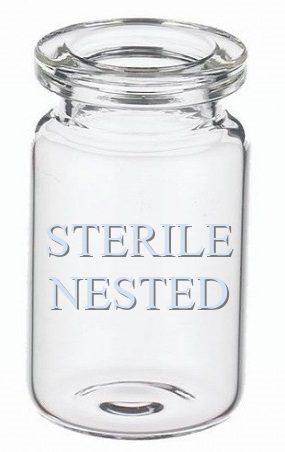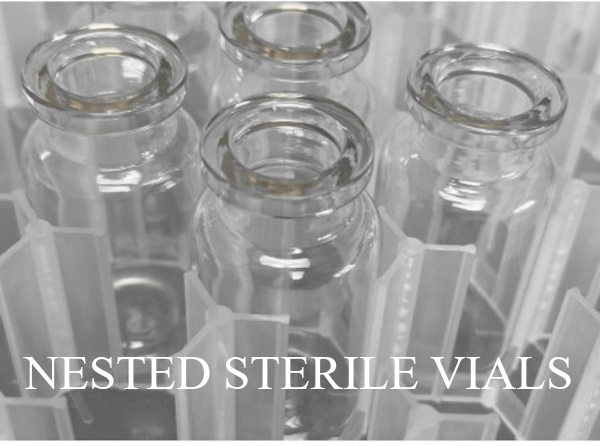
Clindias of Kansas offers the highest quality open sterile nested vials that meet ISO standards for clients worldwide. One important aspect to consider when choosing a sterile vial is the analytical testing performed and the supportive documentation: QUALITY CERTIFICATES
Essential Aspects of a Sterile Vial Certificate of Compliance
A Certificate of Compliance (CoC) for sterile vials in the pharmaceutical industry is a critical document ensuring that the vials meet rigorous standards. For sterile open vials in a standard open tray or in a nested sterile vial tray, the certificates we offer cover the following 12 key aspects:
- Type I Glass Certification
Certificates should confirm that the vials are made from Type I borosilicate glass. This glass type must comply with the glass grains test requirements set forth by the latest editions of the United States Pharmacopeia (USP), European Pharmacopeia (EP), Japanese Pharmacopeia (JP), and other relevant pharmacopeias. This ensures the glass meets Type I or hydrolytic class standards. - Arsenic Certification
Our open sterile nested vials C of A certify that the glass tubing used for the vials meets the arsenic content limits of less than 0.1 ppm as required by the most recent editions of the USP and EP. - Heavy Metals Certification
A C of A certificate should state that the levels of lead, cadmium, mercury, and hexavalent chromium in the glass are significantly below the limit of 100 ppm by weight, complying with US (TPCH and CONEG) and EC regulations. - Converted Product Certification
The sterile vial certificate should confirm that all checks and challenges were within normal parameters throughout production. It should verify that sampling, annealing checks, and inspections (visual, mechanical, or electronic) were performed, and that defects were within acceptable limits as per the sales contract and quality agreement. - Hydrolytic Resistance
Our open sterile vial certificates affirm that the inner surfaces of the glass containers meet the hydrolytic resistance requirements of USP and EP. If sulfur treatment was used, the certificate must confirm compliance with BTB testing and/or hydrolytic resistance testing per the customer’s specifications. - Washing Process
Open sterile vials C of A should certify that all glassware underwent a washing process using water that meets WFI (Water for Injection) quality standards. The process and quality control measures must align with the specifications of the USP. - Terminal Sterilization Conformity
The Certificate of Conformance should verify that both the component and packaging materials used in the vials meet specified material and formulation requirements. It should confirm that the vials were subjected to terminal sterilization and that all production and inspection processes adhered to the agreed-upon quality levels. - Ethylene Oxide Residuals
Sterile vials that are sterilized by Ethylene Oxide should have a certificate that confirms that the vials meet the permissible residue levels for ethylene oxide as per ANSI/AAMI/ISO 10993-7:2008 standards. This includes residuals of ethylene chlorohydrin (≤9.0 mg/Device) and ethylene oxide (≤4.0 mg/Device). - Product Sterility
Our open sterile vials, nested and standard tray certify that the vials meet the sterility test requirements under USP <71> using the direct method, ensuring that the product is sterile. - Bacterial Endotoxins
Open sterile vial quality certificates should confirm that the vials comply with the bacterial endotoxin test under USP <85>, with results not exceeding 0.125 EU/mL. - TSE/BSE Compliance
Our Gerresheimer brand sterile vials verify that the glass containers and associated packing materials comply with all TSE/BSE (Transmissible Spongiform Encephalopathy/Bovine Spongiform Encephalopathy) requirements, ensuring safety against prion diseases. - Spectral Transmission for Colored (amber) Glass
If the vials are made of amber glass, our certificates confirm compliance with light resistance requirements. This involves verifying that the spectral transmission of the glass meets the standards set by the USP and EP.
Conclusion
A comprehensive Certificate of Compliance for sterile vials covers these essential aspects to ensure the vials are safe, effective, and meet regulatory standards. It is vital for pharmaceutical manufacturers to ensure that these criteria are met to maintain product quality and safety throughout the manufacturing process. The open sterile vials offered by Clindias of Kansas, manufactured by GERRESHEIMER, are accompanied by a Quality Certificate ( C of A ) that outlines all of the above 12 criteria.
If you have an interest in our open sterile vials, click one of the 2 categories below for pricing and ordering:
STERILE OPEN VIALS - READY TO USE RTU - READY TO FILL RTF (standard trays)
or - our newest addition

